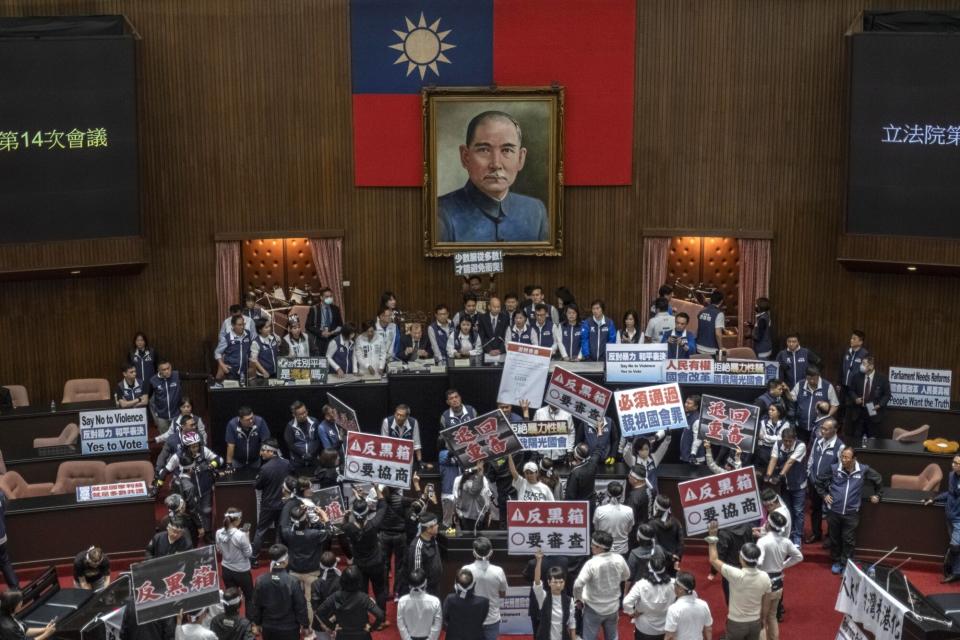Protest Erupts in Taiwan Over Plan to Curb New President’s Power
(Bloomberg) -- Supporters of Taiwan’s new president are protesting an attempt by the China-leaning opposition to curtail his powers.
Most Read from Bloomberg
One Dead After Singapore Air Flight Hit By Severe Turbulence
‘It Felt Like We Had Crashed’: Singapore Air Passenger Describes Turbulence Terror
Barclays Managers Warn Some Staff to Prepare for Five Days a Week in Office
On Tuesday, lawmakers from the Kuomintang kicked off the final steps toward passing a law that would require President Lai Ching-te to deliver an address to them every year, appear separately to answer questions and provide a range of documents when asked.
The law would also allow officials to be jailed if they are found lying to the legislature — a change that has the potential to bog Lai’s officials down in court proceedings.
The proposed legislation could be passed in the coming days and make it difficult for Lai to govern the chip hub at the epicenter of US-China tensions. The ruling Democratic Progressive Party says the bill is being rushed through the legislature without enough consultation, while the KMT insists all the proper procedures have been followed.
“It appears to be an attempt to weaken the government’s ability to govern effectively,” said Wen-ti Sung, a Taipei-based nonresident fellow with the Atlantic Council’s Global China Hub.
He added that that “the incredible speed at which the opposition is pushing through this controversial bill, in the absence of meaningful public or parliamentary discussions, has been raising concerns about legislative overreach.”
Read More: Taiwan’s KMT Plans Legislative Power Grab to Curb Incoming Lai
Underscoring how contentious the bill is, lawmakers scuffled in the legislature last week, leaving several with minor injuries.
On Tuesday, DPP lawmakers tried to slow the legislation’s progress. Both the ruling party and the KMT waved posters with slogans on them, creating a colorful atmosphere in the normally staid legislature.
Outside the building, several hundred Lai supporters gathered in the light rain to call for more talks on the KMT’s plans. Some of them chanted: “If there’s no discussions, then there’s no democracy.”
Activists appeared to be preparing for bigger demonstrations, setting up tents, medical stations, and an area for storing donations of food and water.
Some of Lai’s backers have referred to the Sunflower Movement of 2014, when tens of thousands of protesters disrupted the work of lawmakers for weeks.
The dispute then was over KMT plans to boost trade with China, which has pledged to bring the democratically run island of 23 million people under its control someday, by force if necessary. The movement ultimately succeeded in forcing the KMT to drop those plans.
Lai won just 40% of the vote in a three-party race for the presidency earlier this year, while the KMT won the most seats in the legislature and took control of the speaker’s role.
That will complicate his next four years in office, which will also likely involve a testy relationship with China. Beijing refused to engage with Lai’s predecessor, Tsai Ing-wen, because she wouldn’t acknowledge that the island is part of China. Instead it ramped up military, diplomatic and economic pressure on her government.
Lai said in his inauguration address on Monday that China should cease its military intimidation of Taiwan and hold talks with his government on an equal basis on issues such as resuming tourism, which has been halted in recent years.
China sharply criticized Lai’s remarks, saying he “sent a dangerous signal of seeking ‘independence.’” Earlier in the day it leveled sanctions on three US defense contractors for arms sales to Taiwan.
Beijing prefers to negotiate with the KMT, and it tries to increase its influence on the island by courting key figures in the party. It has recently hosted for former President Ma Ying-jeou and currently serving lawmakers for visits.
(Updates with more context and details of the protest.)
Most Read from Bloomberg Businessweek
A Hidden Variable in the Presidential Race: Fears of ‘Trump Forever’
Millennium Covets Citadel-Size Commodities Gains, Just Not the Risk
Netflix Had a Password-Sharing Problem. Greg Peters Fixed It
©2024 Bloomberg L.P.




